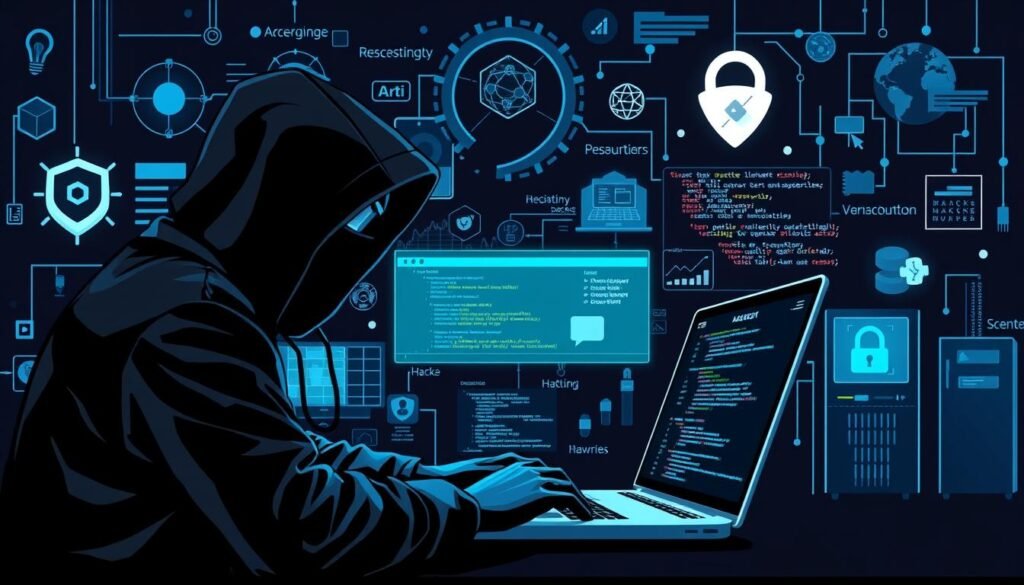In 2021, a huge $4.24 million was the average cost of a data breach. This shows how important cybersecurity is today. Ethical hacking is a key way to keep organizations safe from cyber threats.
Technology is everywhere in our lives now. So, learning about ethical hacking is more important than ever. Ethical hacking is about finding and fixing problems in computer systems before they get worse.
Ethical hackers are like digital security guards. They use their skills to keep companies safe from bad hackers. They do this with permission, finding weaknesses before cybercriminals can.
Now, 30% of companies use ethical hackers to keep their data safe. This helps stop big problems and keeps important information safe from hackers.
Key Takeaways
- Ethical hacking is a legal and authorized method of identifying security vulnerabilities
- The average cost of a data breach can reach millions of dollars
- Ethical hackers help organizations prevent possible cyber attacks
- Cybersecurity is critical in protecting digital assets and information
- Penetration testing is a key part of ethical hacking
Introduction
Cybersecurity is key in our digital world. As tech grows, so does the need to protect and defend digital systems. Knowing about hacking for security is vital for digital safety.
The Role of Ethical Hackers in Cybersecurity
Ethical hackers protect companies from cyber threats. White hat hacking means finding and fixing problems before bad guys can. They use their skills to:
- Do deep security checks
- Practice fake cyber attacks
- Make strong defense plans
- Keep digital secrets safe
Ethical vs. Malicious Hacking: Key Differences
There are two main ways to get into systems. Ethical hackers get permission to help. Malicious hackers try to harm for their own reasons.
“Ethical hacking is not about breaking into systems, but about protecting them from those who would cause harm.”
Here’s what sets them apart:
- Intent: Protecting vs. Exploiting
- Permission: Authorized vs. Unauthorized
- Outcome: Security Improvement vs. Damage
Understanding these differences shows how important ethical hackers are. They keep our digital world safe in a complex tech world.
The Basics of Ethical Hacking

Cybersecurity needs a proactive way to protect digital stuff. Knowing how to keep networks safe is key. This helps fight off new cyber threats.
Understanding Cyber Threats
Cyber threats are many and aim to find weak spots in your digital world. Penetration testing shows how important it is to find these security holes:
- Phishing attacks target your login info
- Malware tries to mess with your system
- Denial-of-service attacks stop your network
- Man-in-the-middle attacks sneak into your messages
The Importance of Penetration Testing
Testing how hackers might attack is key for keeping digital stuff safe. Penetration testing is a detailed way to find and fix weak spots:
| Penetration Testing Phase | Key Activities | Success Rate |
|---|---|---|
| Reconnaissance | Getting info | 70% find vulnerabilities |
| Scanning | Check networks and systems | 50% faster checks |
| Exploitation | Find security flaws | 60% find big flaws |
| Reporting | Write up findings | 85% useful tips |
“Ethical hacking is not about breaking into systems, but about finding vulnerabilities before malicious actors do.” – Cybersecurity Expert
By doing deep penetration tests, companies can get stronger. The world of cyber threats keeps changing. So, it’s vital to keep checking and updating your digital defenses.
Key Skills Required for Ethical Hacking

Starting an ethical hacker job needs a mix of tech skills and smart thinking. Cybersecurity experts must know how to move through digital worlds safely. They must also keep high ethical standards.
When we talk about hacking vs ethical hacking, the big difference is in goals and methods. Ethical hackers aim to protect systems, not harm them.
Programming and Networking Fundamentals
Getting into ethical hacking starts with learning basic tech skills. Important programming languages include:
- Python for scripting and automation
- JavaScript for web app security
- C++ for system-level knowledge
- SQL for checking database vulnerabilities
The need for ethical hackers is growing fast. Knowing networking is key to find system weaknesses.
Security Tools and Exploitation Techniques
Pro ethical hackers use special tools for deep security checks:
- Metasploit for penetration tests
- Wireshark for network scans
- Nmap for finding networks
- VirtualBox for safe testing
“The best defense is a good offense” – This idea guides ethical hacking.
With an average US salary of $68,942 a year, ethical hacking is a rewarding career. It’s for those serious about keeping the internet safe.
Legal and Ethical Aspects

Understanding legal and ethical rules is key in ethical hacking. You need more than just tech skills. You must also follow professional ethics and laws.
Ethical Hacking Certifications: Your Professional Passport
Getting an ethical hacking certification is vital. It shows you’re serious about cybersecurity. The top certifications are:
- Certified Ethical Hacker (CEH)
- Offensive Security Certified Professional (OSCP)
- CompTIA Security+
These certifications prove your skills and dedication. They can lead to jobs paying $80,000 to $150,000 a year. This shows how much companies value skilled hackers.
Understanding Hacker Categories
“In cybersecurity, your intent defines your impact.” – Cybersecurity Expert
Companies hire ethical hackers for three main reasons:
- White Hat Hackers: Legal pros who protect systems
- Black Hat Hackers: Bad guys who try to break in
- Grey Hat Hackers: Walk a gray line
Legal Considerations in Ethical Hacking
Ethical hackers need clear permission from clients. They must follow laws like GDPR and ISO 27001. By 2025, cybercrime could cost $10.5 trillion a year. This highlights the importance of ethical hacking.
Your actions must respect privacy and confidentiality. Always aim to prevent harm and keep systems safe.
Conclusion
This ethical hacking guide has shown you how important cybersecurity basics are. The world of cyber threats keeps changing. This means we need more people who can fight off bad attacks.
The cybersecurity field is growing fast. It’s expected to hit $345.4 billion by 2026. This means you have lots of career chances ahead.
Starting in ethical hacking takes hard work and learning. You need to know about networking, programming, and security tools. Ethical hacking is more than just tech skills. It’s about keeping our digital world safe.
To do well in this field, keep up with new tech, get the right certifications, and always act ethically. There’s a big need for cybersecurity experts, with a shortage of 3.5 million by 2025. Ethical hackers help keep our digital world safe, cutting down cyber-attack risks by half.
Keep building your skills, join Capture the Flag events, and try bug bounty programs. Penetration testers in the U.S. make about $95,000 a year. Ethical hacking is not just a job. It’s a way to really help keep our digital world safe.
FAQ
What exactly is ethical hacking?
How is ethical hacking different from malicious hacking?
What certifications are important for becoming an ethical hacker?
What programming languages should I learn for ethical hacking?
What tools do ethical hackers typically use?
Is ethical hacking legal?
What are the main phases of penetration testing?
What cybersecurity threats do ethical hackers typically address?
How can companies benefit from ethical hackers?
What career opportunities exist in ethical hacking?
Source Links
- What is Penetration Testing in Cybersecurity? A Beginner’s Guide
- Top 52+ Ethical Hacking Interview Questions and Answers for Success in 2025
- 5 Best Hacking Books for Beginners – FROMDEV
- Types of Cyber Attacks Explained [2025]
- Kali Linux Tutorial – GeeksforGeeks
- CEH: Advanced Penetration Testing Guide
- Ethical Hacking | The Offensive Side of Cyber Security
- Recommended
- Top 8 Skills Required for Ethical Hacking in 2024 | Careervira.com
- How to become an ethical hacker: A blueprint
- What Is an Ethical Hacker? [+ How to Become One]
- Cybersecurity Vs. Ethical Hacking: Top 10 Differences in 2025
- Hacktivism, Ethical Hacking, and Grey Hats – IKARUS Security Software
- Passive vs. Active Reconnaissance in Ethical Hacking
- Ethical Hacking – Web Asha Technologies
